Bichon FriseThe Perfect Hypoallergenic Companion 🟢 Hypoallergenic Level: Excellent - Highly suitable for people with allergies
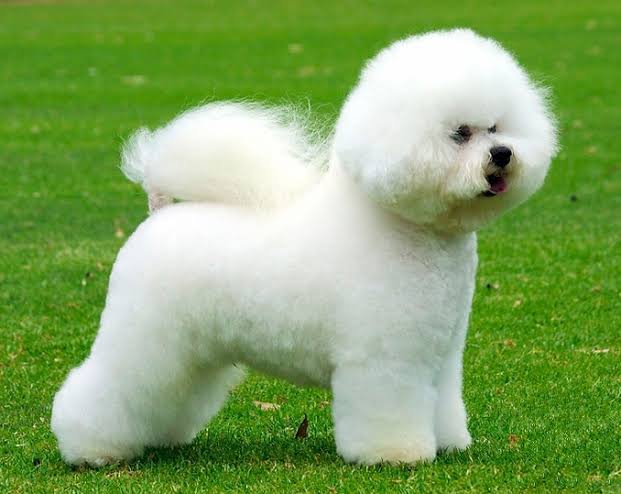
🏷️ Key CharacteristicsSize: Small
Height: 9-12 inches (23-30 cm) Weight: 12-18 pounds (5.5-8 kg) Lifespan: 14-15 years
Activity Level: Moderate Care Difficulty: Moderate to High Hypoallergenic: ✅ Yes
Shedding: Minimal Training: Moderately Easy 🏛️ Origin & History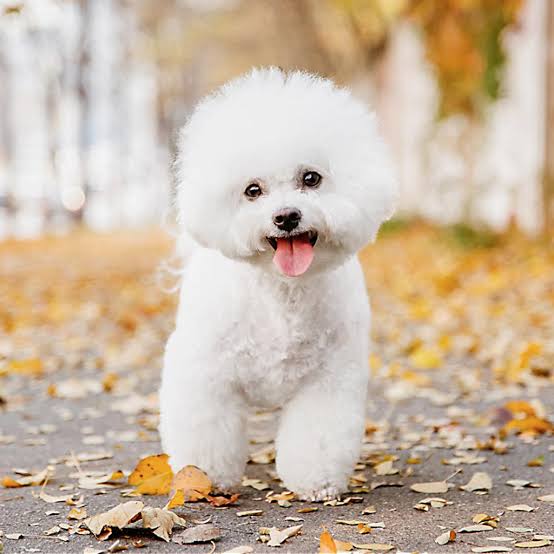
The Bichon Frise has a fascinating history that spans several centuries and continents. Originally developed in the Mediterranean region, this charming breed is believed to have descended from the Barbet, a larger water spaniel, and possibly the Poodle. The name "Bichon Frise" literally means "curly lap dog" in French, perfectly describing this breed's distinctive appearance and purpose. During the 14th century, Italian sailors discovered these delightful dogs on the Canary Islands and brought them back to the European continent. The breed quickly gained popularity among the French and Italian nobility, becoming a favorite companion of aristocrats and royalty. They were particularly beloved during the Renaissance period, often appearing in paintings alongside their noble owners. The breed's fortunes fluctuated with political changes in Europe. After the French Revolution, many Bichon Frises found themselves without aristocratic homes and had to survive as street performers and circus dogs. Their intelligence and charming personality made them natural entertainers. The breed was nearly extinct after World War I, but dedicated breeders worked to revive the bloodline. The American Kennel Club officially recognized the Bichon Frise in 1973, and since then, it has become one of the most popular hypoallergenic companion breeds worldwide. 💕 Character & Temperament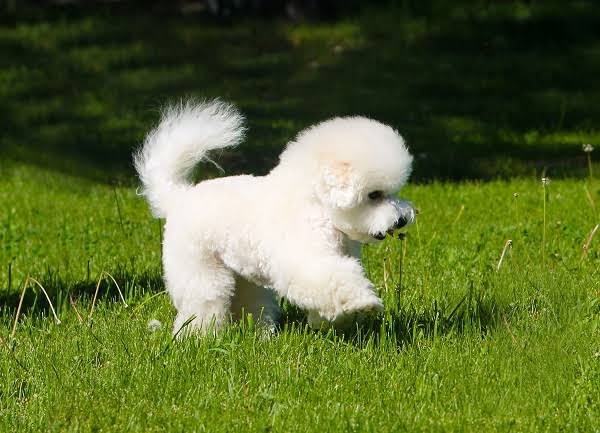
The Bichon Frise is renowned for its cheerful, affectionate, and playful personality. These dogs are natural comedians who seem to have an innate understanding of how to make their owners smile. They possess an optimistic outlook on life that is truly infectious, making them excellent therapy dogs and emotional support animals. Social butterflies by nature, Bichon Frises thrive on human companionship and generally get along well with other pets and children. They are known for their gentle and patient demeanor, rarely showing aggression even when provoked. However, they can be somewhat wary of strangers initially, making them decent watchdogs despite their small size. One of the most endearing traits of the Bichon Frise is their adaptability. Whether living in a bustling city apartment or a quiet suburban home, these dogs adjust remarkably well to their environment. They are intelligent and eager to please, which makes training generally straightforward, though they can occasionally display a stubborn streak that requires patience and consistency. 👀 Physical Appearance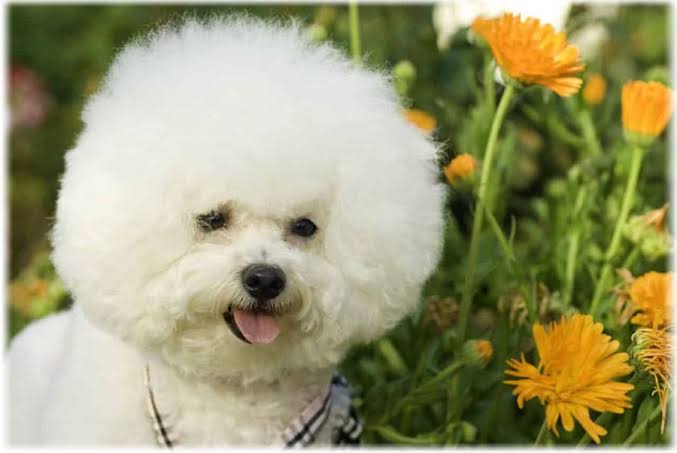
The Bichon Frise is instantly recognizable by its distinctive white, fluffy coat that gives it the appearance of a living cotton ball or powder puff. This breed has a compact, well-proportioned body that is slightly longer than it is tall, creating an elegant yet sturdy silhouette. The breed's most striking feature is undoubtedly its double-layered coat. The outer coat is coarse and curly, while the undercoat is soft and dense. The coat is always pure white, though puppies may have cream or apricot markings that fade as they mature. The texture of the coat is crucial for its hypoallergenic properties, as the tight curls trap dander and prevent it from becoming airborne. Bichon Frises have dark, round eyes that sparkle with intelligence and mischief, complemented by a black nose and lips that create a charming contrast against their white coat. Their ears are drop-shaped and covered with long, flowing hair. The tail is plumped with hair and carried curved over the back, adding to their aristocratic appearance. Their scissors bite and well-aligned teeth complete their refined facial structure. 🏃 Activity Needs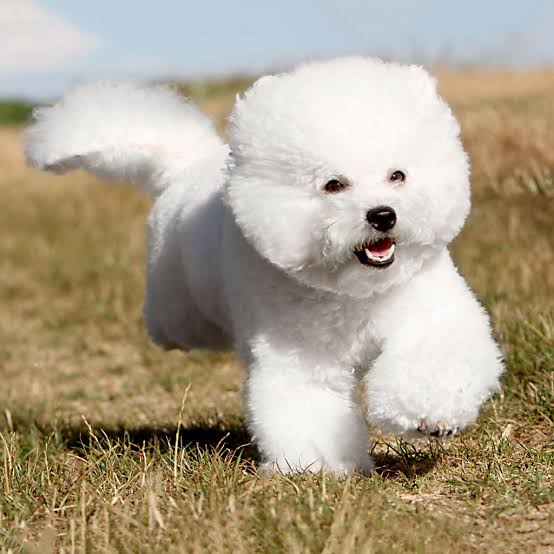
Despite their small size, Bichon Frises have moderate to high energy levels and require regular exercise to maintain their physical and mental health. These dogs were bred to be companions, not working dogs, so their exercise needs are manageable for most owners. Daily walks of 30-45 minutes combined with interactive play sessions are typically sufficient to keep a Bichon Frise happy and healthy. They particularly enjoy games of fetch, tug-of-war, and hide-and-seek. Mental stimulation is equally important as physical exercise, as these intelligent dogs can become destructive when bored. Bichon Frises excel at agility training and dog sports due to their athleticism and eagerness to please. They also enjoy swimming, though their coat requires thorough drying afterward to prevent matting. Indoor play can meet much of their exercise needs, making them suitable for apartment living, but they still benefit from outdoor adventures and socialization opportunities. ✂️ Grooming Care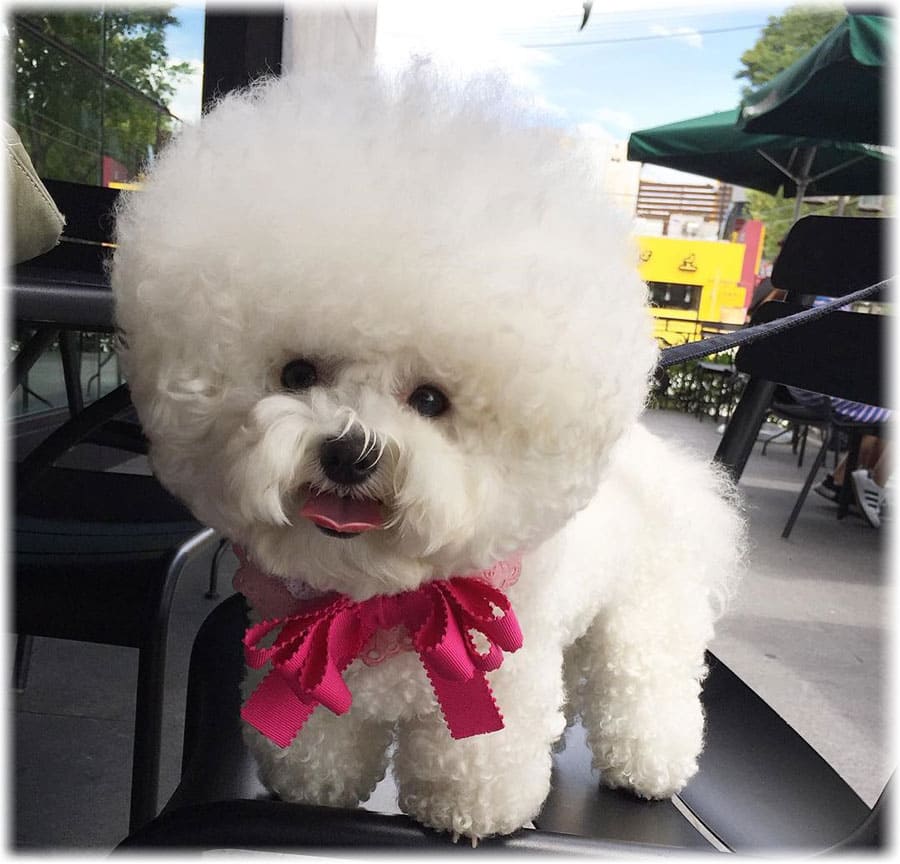
The Bichon Frise's beautiful coat is both its greatest asset and its most demanding feature. Professional grooming every 4-6 weeks is essential to maintain the breed's characteristic appearance and prevent matting. The coat grows continuously and requires regular trimming to keep it manageable. Daily brushing is absolutely crucial to prevent the formation of mats and tangles. Use a slicker brush and metal comb to work through the entire coat systematically. Pay special attention to areas prone to matting, such as behind the ears, under the arms, and around the legs. Bathing should be done every 3-4 weeks or as needed, using a high-quality dog shampoo designed for white coats. Professional groomers typically style Bichon Frises in the classic "powder puff" cut, which enhances their natural beauty while keeping the coat manageable. Nail trimming, ear cleaning, and dental care should be part of the regular grooming routine. The breed's tear stains can be minimized through proper diet, regular face cleaning, and using filtered water. 🍽️ Nutrition Needs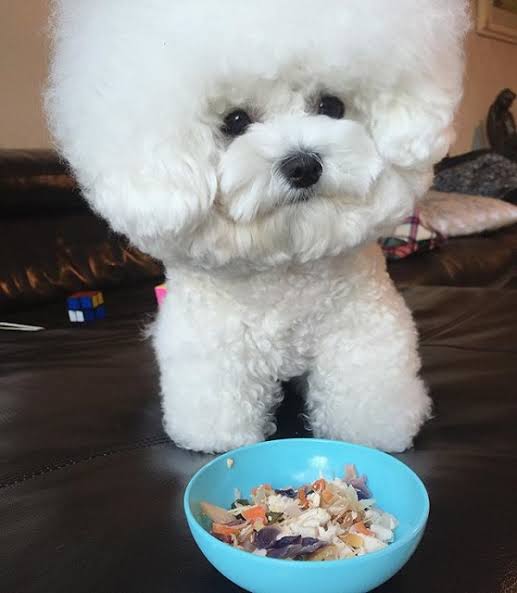
Bichon Frises require high-quality nutrition to maintain their energy levels, coat quality, and overall health. As small dogs with relatively high metabolisms, they need nutrient-dense foods that provide adequate calories without leading to weight gain. Adult Bichon Frises typically need 1/2 to 1 cup of dry food daily, divided into two meals. The exact amount depends on the dog's age, activity level, and metabolism. Puppy Bichons require more frequent feeding - three to four small meals per day until they reach six months of age. Look for dog foods that list high-quality protein as the first ingredient and avoid foods with excessive fillers or artificial additives. Some Bichon Frises may have food sensitivities or allergies, particularly to chicken or grain-based ingredients. Omega-3 fatty acids are particularly beneficial for maintaining their coat's health and luster. Always provide fresh water and monitor your dog's weight, as Bichons can be prone to obesity if overfed. 👨👩👧👦 Suitable For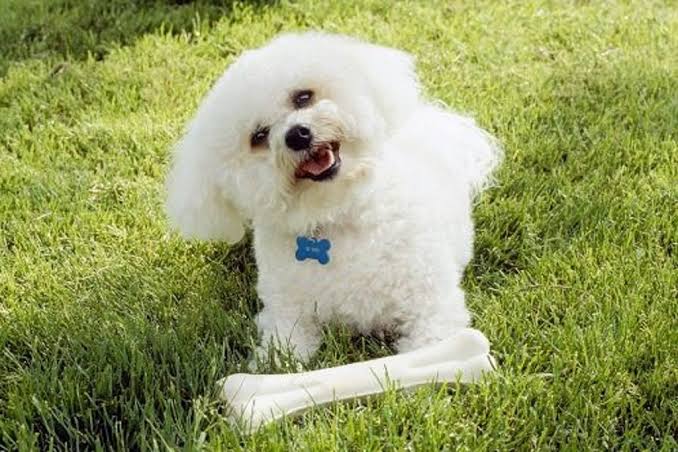
Families with ChildrenBichon Frises are excellent family dogs and are particularly good with children. Their gentle, patient nature and playful personality make them ideal companions for kids of all ages. However, due to their small size, supervision is recommended with very young children to prevent accidental injury. Apartment LivingPerfectly suited for apartment living, Bichon Frises adapt well to smaller spaces as long as their exercise and mental stimulation needs are met. Their moderate barking tendencies and friendly nature make them good neighbors in close-living situations. First-Time Dog OwnersWhile Bichon Frises can be suitable for beginners, potential owners should be prepared for the grooming commitment. Their friendly temperament and moderate training requirements make them manageable for first-time owners who are dedicated to proper care and maintenance. SeniorsThese dogs make wonderful companions for older adults due to their affectionate nature and moderate size. However, the grooming requirements and need for regular exercise should be considered. ⚖️ Pros & Cons✅ Advantages
❌ Challenges
❓ Frequently Asked Questions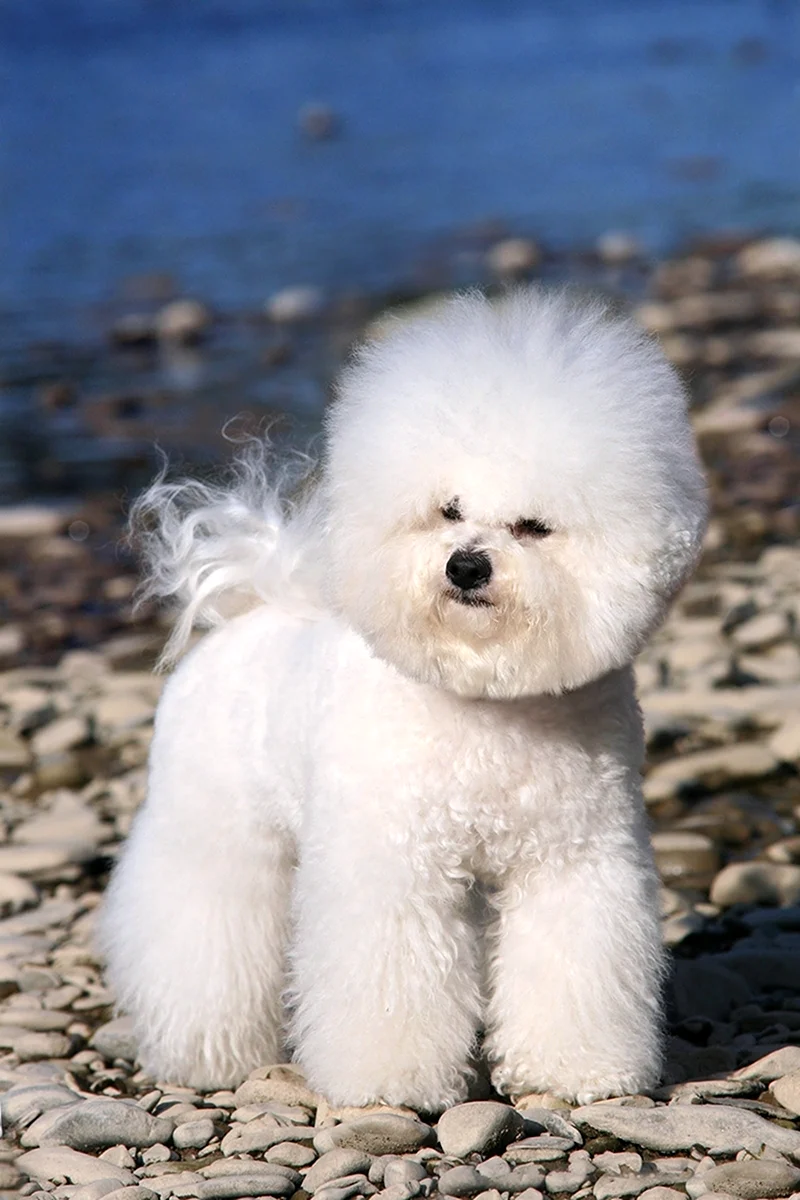
Are Bichon Frises truly hypoallergenic?While no dog is 100% hypoallergenic, Bichon Frises are among the best choices for people with allergies. Their curly, non-shedding coat traps dander and prevents it from becoming airborne, significantly reducing allergic reactions. 📖 Read our complete guide on Bichon Frise hypoallergenic properties → How much grooming do Bichon Frises really need?Daily brushing is essential, and professional grooming every 4-6 weeks is recommended. Without proper grooming, their coat will mat severely and may require shaving, which defeats the purpose of their hypoallergenic qualities. Do Bichon Frises bark a lot?Bichon Frises are moderate barkers. They may bark to alert you of visitors or when excited, but they're not typically excessive barkers like some small breeds. Proper training can minimize unnecessary barking. Are Bichon Frises good with other pets?Yes, they generally get along well with other dogs and cats, especially when socialized from a young age. Their friendly nature makes them excellent multi-pet household companions. What health problems are common in Bichon Frises?Common health concerns include hip dysplasia, luxating patella, allergies, and eye problems. Regular veterinary check-ups and choosing reputable breeders can help minimize these risks. How much exercise does a Bichon Frise need?30-45 minutes of daily exercise combined with mental stimulation is typically sufficient. This can include walks, indoor play, and interactive games. 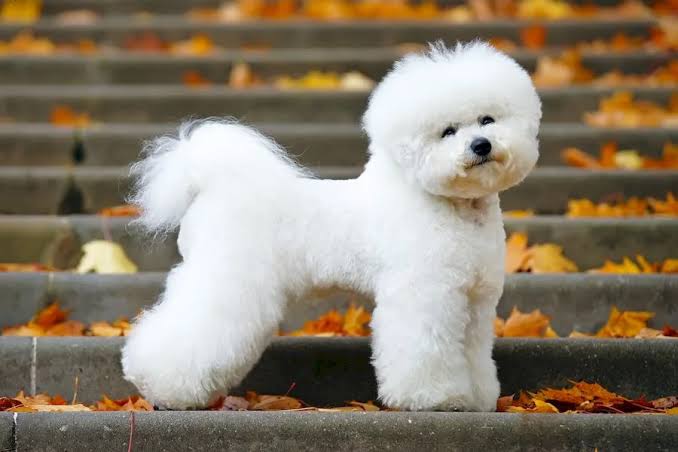
The Bichon Frise - a perfect blend of charm, intelligence, and hypoallergenic qualities, making it an ideal companion for families seeking a loving, low-allergen pet. | |
|
| |
| Переглядів: 215 | | |
| Total comments: 0 | |